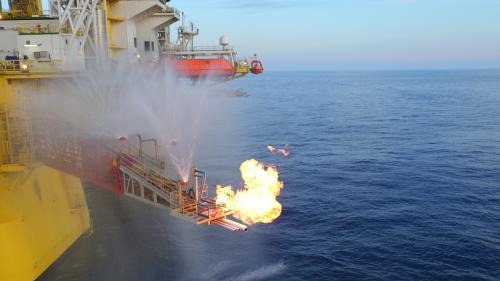Another moment of truth in SCS - how dreaful things could be without a strong Asia Pacific leadership =======
Jakarta shocked by deadly bombings days before Ramadhan
Jakarta | Thu, May 25, 2017 | 01:59 am
Police officers place tape near covered up human remains at the Kampung Melayu bus terminal in East Jakarta after a bomb blast on Wednesday. A suspected suicide bombing rocked the busy bus terminal, killing three policemen in the latest terror attack to hit Jakarta. (AFP/Bayu Ismoyo)
Only hours before Jakartans looked forward to enjoying the Ascension of Jesus Christ public holiday, a twin bomb attack struck the Kampung Melayu Transjakarta bus terminal on Wednesday night.
Two suspected suicide bombers died instantly, the police said.
At least five policemen who were
escorting a traditional parade to welcome the Islamic fasting month of Ramadhan also fell victim, three of whom are reported to have died. At least five civilians were also injured.
(Read also: Chaos erupts after suspected bomb blasts strike Kampung Melayu bus terminal)
The terrorist attack took place while the world was still mourning the victims of the
suicide bombing of the concert by US pop star Ariana Grande in Manchester, UK, only a day before.
The busy Transjakarta bus rapid transit hub in East Jakarta and the surrounding area descended into chaos after the explosions. The terminal is located in a densely populated area.
Footage and pictures of the scene have gone viral on social media. Some of the footage shows people panicking, screaming and running away from the terminal. Other images depict scattered body parts.
Traffic around the scene was blocked off and rerouted.
A police officer guards the bomb site at the Kampung Melayu bus station in East Jakarta. (Antara/Sigid Kurniawan)
National Police spokesman Insp. Gen. Setyo Wasisto said one explosion occurred at a motorcycle parking lot.
“The glass at the corridor seven [bus stop], where passengers alight, was smashed to pieces,” Transjakarta president director Budi Kaliwono said, adding that the Transjakarta service would continue, but would not stop at Kampung Melayu.
He added that no Transjakarta staff or passengers were among the casualties and urged members of the public to immediately report any suspicious activities.
The injured victims were
treated at the Premier Hospital and Hermina Hospitalin East Jakarta.
As of midnight, no claim of responsibility for the attack had been received.
Setyo said he was optimistic the police would be able to identify the perpetrators and any possible terrorist ring soon.
“The body parts [of the attackers] remain at the scene. The parts from the neck above are still intact so the face can be identified,” he said.
Mobile Brigade personnel from the Jakarta Police are deployed to the area nearby the Kampung Melayu bus terminal in East Jakarta following bomb blasts on Wednesday evening.(Antara/Sigid Kurniawan)
The attack is believed to have been targeted at the police, making it the latest terror attack to have targeted the police in recent years.
On Jan. 14, 2016, Jakarta was rocked by
multiple explosions, including one at a police post, and gunfire around the Sarinah shopping mall in Central Jakarta. At least eight people, including four attackers and four civilians, were killed. A total of 20 people were injured, including five police officers.
Setyo said the police had detected possible attacks in Jakarta. “We were not able yet to identify when or where [they might happen],” he said.
Setyo said the police suspected the perpetrators of the attack were related to terror groups behind other attacks in other countries, including the Manchester bombing.
#PrayForJakarta and #KamiTidakTakut (We are not afraid) emerged on the
worldwide internet trending topic list immediately after the incident.
“Everyone, please stay safe! #PrayforJakarta,” Singer-songwriter Raisa posted on her twitter handle @Raisa6690, which has been retweeted by more than 1,000 users as of 1 a.m. on Thursday.
Everyone, please stay safe!
#PrayforJakarta
— Raisa Andriana (@raisa6690)
May 24, 2017
“Deep condolences over bombing act in Kampung Melayu, Jakarta. Please don’t share any unverified information,” official Twitter Indonesia account @TwitterID posted.
Turut berduka atas aksi pengeboman di Kampung Melayu, Jakarta. Mohon tidak membagikan info yg belum terverifikasi.
#PrayForJakarta
— Twitter Indonesia (@TwitterID)
May 24, 2017
Terrorists have no religion... Pray for Kampung Melayu
#PrayForJakartapic.twitter.com/aqTyNjyZSK
— Ardiles Klimarsen (@artdiles)
May 24, 2017






















